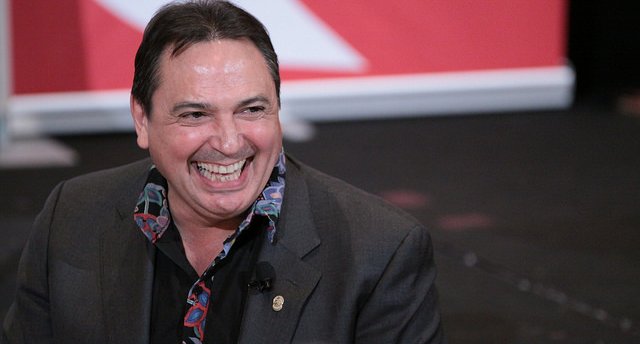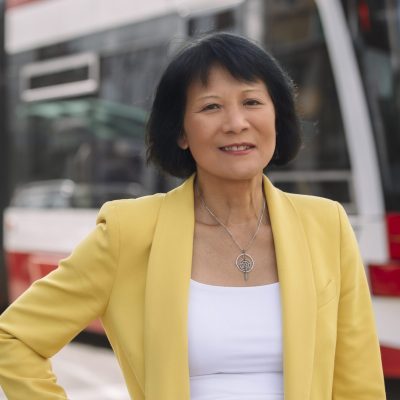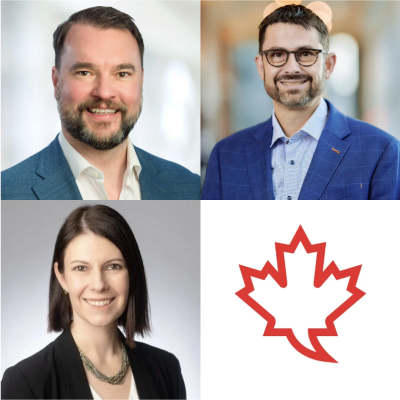Beyond the Podium

National Chief Perry Bellegarde and CBC’s Duncan McCue engaged in a fireside chat on the Canadian Club of Toronto stage this past Wednesday, March 24, 2017. On the docket? “Reconciliation: A Path to a Stronger Canada”.
CCT president Fred Mifflin began by addressing the elephant in the room: Canada’s 150th celebration isn’t necessarily a joyous occasion for all. Indigenous peoples in Canada have endured years of isolation and mistreatment on the land they rightfully own, as Chief Bellegarde reminds us during his time at the Canadian Club. This sesquicentennial is a time for the government and citizens to admit past wrongdoings and commit to a better tomorrow for Indigenous people, the men both agreed.
Bellegarde was then joined by McCue, who asked where the Chief thought Canada was in the reconciliation process. Bellegarde acknowledged that progress was being made, but not quickly enough. Reconciliation, in his mind, will come to fruition when ‘there is no more dead people in rivers, when the suicide rate for young Indigenous people is not 5-7 times the national average, when there is no longer 40,000 First Nations children in foster care, when the incarceration rate for Indigenous peoples is not abnormally high despite being only 4.5% of Canada’s population, and when Indigenous peoples are not shut off from the Canadian economy’, among other things. He pointed out that Canada is regarded as having the 6th highest ranking for quality of life in the world; when Indigenous peoples quality of life is put up against the same criteria, they rank 63rd. The road to possible, whole reconciliation? ‘The creation of partnerships/relationships, and admitting the truth.’, says Bellegarde.
McCue then mentioned a period in 1990 that has, what he regards as, a similar feeling to the present. Directly after the Oka Crisis, relations were considerably less tense and there seemed to be a heftier commitment to improving the relationship between Indigenous peoples and the Canadian government. McCue posed a question to Bellegarde: are we in a similar period now, that has the opportunity to see real, tangible change? Bellegarde responded: “Change is good.” With 94 calls to action from the Truth and Reconciliation Commission and countless reports being written, Bellegarde is hopeful. He cautions, however, that reports are only helpful if implemented. He admitted that although he has no allegiance to a political party, the change of government from Conservative to Liberal did look to be a light at the end of the tunnel. His commitment now is to hold Prime Minister Trudeau and the MPs accountable.
McCue came back to the question of economic isolation, by quoting Bellegarde’s 2014 victory speech, where he said: “If our lands and resources are to be developed, it’ll be on our terms and timeline.” The exploitation and wrongful claiming of natural resources has resulted in Indigenous peoples being for the most part, unable to participate in the Canadian economy. Additionally, this misappropriation of resources means that there are no jobs and ultimately, no revenue sharing. Resource development to Bellegarde, means striking the correct balance between a healthy economy and sustainability.
Discussion about UNDRIP (United Nations Declaration on the Rights of Indigenous Peoples) and FPIC or free prior and informed consent lead us into the last portion of the event. FPIC is the principle that allows self-determination when it comes to the transformation of land. Essentially, FPIC gives Indigenous peoples the right to say “yes” or “no” when approached about land development. Bellegarde called for respectful dialogue with Indigenous peoples before anything is built, but also for an increase of senior decision making roles. When McCue asked about Bellegarde’s understanding of self-determination, Bellegarde was quick to make it clear that Indigenous peoples are not without their differences. The idea that every tribe, or that every person has the same feelings about any given issue is at best, silly, and at worst, dangerous. He pointed out that there are 634 First Nations Chiefs in Canada that represent 58 different tribes, and he was doing his best to represent the voices of all of these people at once.
When it comes to education, Bellegarde affirmed that he’s been lobbying the government with the help of other departments. On average, Indigenous students on reserve are receiving nearly half as much funding as kids that attend public schools off-reserve. Bellegarde said that while there is a large amount of money to be dealt with, the visions of Indigenous and Northern Affairs have to line up with that of the cabinet. He said that he is a firm believer that “there’s no better way out of poverty than education.” This entails but isn’t limited to on-reserve daycare, health benefits and combatting suicide in Indigenous communities.
Chief Bellegarde and Duncan McCue provided tremendous insight into how the Canadian government and its citizens can do better over the next 150 years. We have to be dedicated to making sure it doesn’t take that long. One of Bellegarde’s sentiments toward the end seemed to employ a reoccurring theme from the day: balance. He appealed to the Indigenous youth that may be watching the webcast, and implored them to find their version of balance. He encouraged them to find their feet in both worlds. To be open to new opportunities outside of their culture, but to never forget who they truly are. Balance will be the path to reconciliation, he affirmed.
———————————————————————————————————-
If you’d like to know more about the Canadian Club of Toronto or our upcoming events, visit us at canadianclub.org. Find us on Twitter: @CdnClubTO, Instagram: @CdnClubTO or Facebook: Canadian Club Toronto.
Special thanks to Chief Perry Bellegarde and Duncan McCue for being guests of the Canadian Club of Toronto. Thanks extended to President Fred Mifflin for hosting the event.
Upcoming Events
Upcoming Events

Event Image List - multi_panelists (showing Featured Image)
Thursday, November 13, 2025
Dawn Desjardins (Deloitte Canada), Brice Scheschuk (Globalive Capital) & Michael Serbinis (League) with Sean Speer (The Hub)

Divider – White
Sign Up
Don’t miss out
Sign up to receive updates on upcoming events and speakers.
Divider – White
Become a Member

Become a Member
Members can enjoy the benefits of access to our archives, advance notice of exclusive events, discounts & more!


